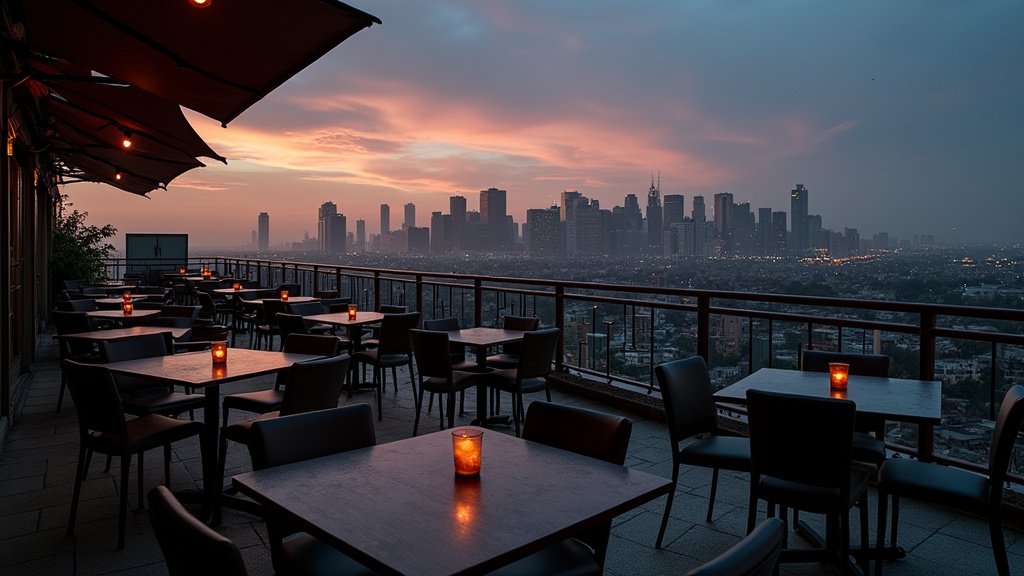Los Angeles, CA – LA Cha Cha Chá, a widely popular Mexican restaurant and rooftop lounge nestled in the city’s Arts District, is set to permanently close its doors, marking a significant blow to the downtown Los Angeles dining scene. Co-owner Alejandro Marín confirmed the impending closure, attributing it directly to severe cumulative losses incurred in the wake of Immigration and Customs Enforcement (ICE) raids and subsequent protests that gripped the Downtown Fashion District in June.
Since its opening in 2021, LA Cha Cha Chá had quickly established itself as a post-COVID success story, lauded for its inventive margaritas, aquachile verde, and rockfish al pastor tacos, offering an “elevated” Mexican food experience that attracted both locals and tourists. The restaurant, a sister establishment to Mexico City-based Grupo Palmares’ Terraza Cha Cha Chá, also held a coveted spot in the MICHELIN Guide USA.
The Unfolding Crisis: Raids, Protests, and Curfews
The crisis for LA Cha Cha Chá, and indeed many other businesses, began on June 6 when ICE initiated major operations across Los Angeles County. These raids targeted multiple locations, including a Home Depot in Westlake and an Ambiance clothing store in the Fashion District, just blocks from the vibrant restaurant. Federal agents, including those from the FBI and Homeland Security Investigations, detained dozens of individuals, with reports indicating 44 arrests for suspected immigration violations.
The federal actions immediately sparked widespread and often intense protests in downtown LA, with demonstrators clashing with law enforcement and federal agents near the Roybal Federal building. The volatile situation escalated to the point where the National Guard was deployed to the city, with 2,100 members arriving by June 10 to assist with operations and protect federal property. Mayor Karen Bass subsequently imposed a curfew across a section of downtown to mitigate further unrest and vandalism.
A Downtown Desert: Economic Fallout Spreads
LA Cha Cha Chá initially ceased operations for ten days due to safety concerns amidst the trending unrest. However, even after the protests subsided and curfews were lifted, the economic fallout proved insurmountable. Co-owner Alejandro Marín expressed that despite the restaurant’s vocal support for the protestors, the aftermath severely discouraged customers. “After June, it seemed like everyone was avoiding Downtown, and we don’t see tourists anymore,” Marín told Eater LA, indicating the restaurant’s team expected to remain open for only “a couple of months, maybe three” before permanent closure.
The impact extends far beyond this single notable restaurant. The Downtown Fashion District, particularly Santee Alley, has transformed into a “ghost town,” with business owners reporting revenue drops of 50% to as much as 75%. Foot traffic in the Fashion District plummeted by 30-45% in the weeks following the raids. The pervasive fear within immigrant communities, even among those with legal documentation, has led many to stay home, severely impacting the workforce and customer base for numerous businesses.
This challenging period for Los Angeles businesses is not isolated. Other prominent downtown establishments, like Tokyo Fried Chicken and Angel City Brewery, have also announced closures, though their reasons are multifactorial, including pandemic recovery and lease expirations. The cumulative effect paints a grim picture for the city’s core business districts.
Broader Implications and Community Response
The economic consequences of intensified ICE operations are a national news story, with Latino-focused businesses in other U.S. cities, such as New Bedford, Massachusetts, reporting sales declines of up to 75%. In Chicago, where immigrants constitute a significant portion of the restaurant workforce, owners are holding meetings to inform employees of their rights in response to widespread fears.
Recognizing the profound impact, the LA County Board of Supervisors has considered motions to study the economic toll on small businesses, highlighting that immigrant spending power in Los Angeles County alone accounts for a substantial $79.7 billion annually. Local mutual aid networks have mobilized to provide support, offering legal assistance, financial aid for lost wages, and other critical resources to immigrant families affected by the ongoing enforcement actions. The closure of LA Cha Cha Chá serves as a stark reminder of the far-reaching and often devastating ripple effects of immigration enforcement on local economies and the vibrant cultural fabric of cities like Los Angeles.





